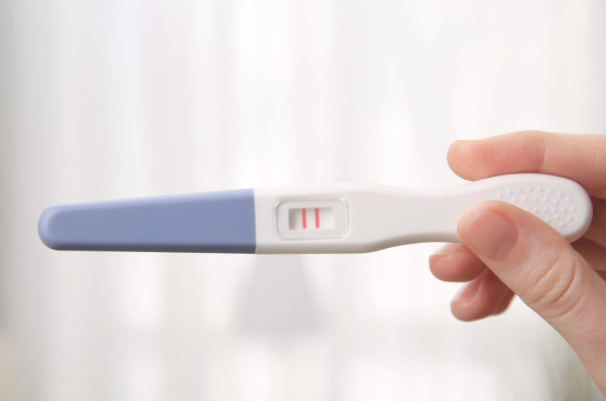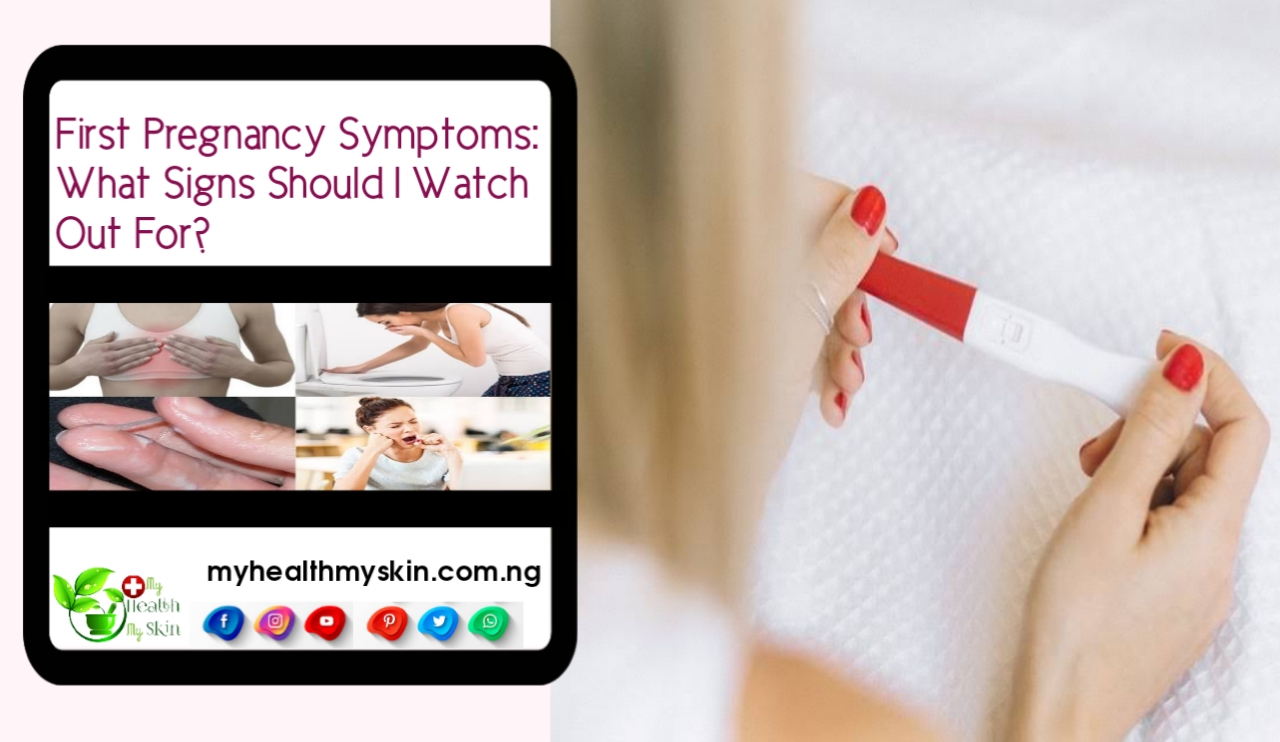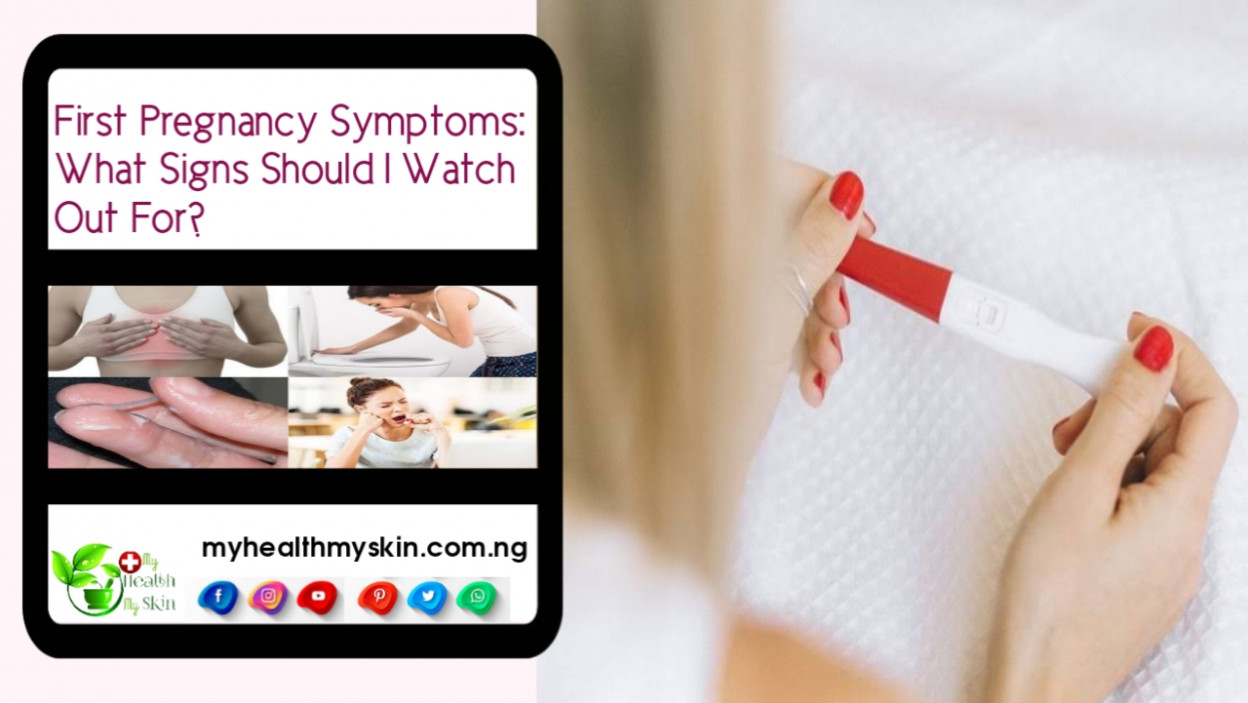Pregnancy is full of events inside a woman’s body and they don’t always notice the symptoms of pregnancy right away.
According to the Ministry of Health, the woman needs to be attentive to diagnose the pregnancy as soon as possible, to avoid damage to the baby’s health and receive adequate monitoring.
Today’s article will analyze which are the major signs and which sign appear first so that women can target. Remembering to always seek medical advice!
[lwptoc]
What Signs Should I Watch Out For?

It is possible to notice some signs of the body that can indicate a pregnancy, in addition to the delay in menstruation.
Some may go unnoticed and others are similar to premenstrual tension (PMS).
To be sure of pregnancy, the only 100% reliable way is the blood test that detects the HCG hormone from 10 days after fertilization.
Pharmacy tests also work relatively well – but if the result is negative and the woman is still having her period late and feeling the body’s signals, it is better to repeat the test.
In addition to the most common signs and symptoms of pregnancy, such as morning sickness, tiredness and breast tenderness, there is another set of signs that are directly related to pregnancy.
The first signs and symptoms of pregnancy can be so subtle that only a few women can notice them, going unnoticed in most cases.
However, knowing what these early signs and symptoms are is a great way for a woman to be more attentive and be able to quickly identify a possible pregnancy.
The most common signs and symptoms of pregnancy include:

Pink Vaginal Discharge
This discharge is called implantation bleeding, but it is the exception rather than the rule. Not all women who become pregnant see it.
We can say that only 20% of women experience this bleeding after implantation. The vast majority cannot detect pregnancy through this bleeding. Implantation bleeding is very low flow, in fact, there should be no flow in this bleeding.
In fact, it happens through the fixation of the embryo and the desquamation that the implantation favors in the endometrium.
To better understand, let’s say that the uterus is a padded field where the baby will settle and when that happens, it will be necessary for the mattress to be opened to accommodate the baby in a small hole in the blood layer.
This act of sinking would draw a small amount of blood from the endometrium and if there is a passage, the blood will flow out of the woman’s vagina.
The vast majority of times that implantation bleeding appears is without flow and for a short time.
How Many Days Does Nidation Last?
We can say that implantation bleeding should not exceed 3 days and should not flow. If so, something could be wrong. In these cases there is the possibility of low hormone (progesterone) which would pose an imminent risk to the recent pregnancy and in this case you need help from a gynecologist.
Implantation Bleeding – Features
But how do I know that the bleeding I had is actually implantation? How do you know it’s not just an escape? Simple, implantation bleeding is when there is pregnancy.
Only with the presence of HCG in the body, it is possible to be 100% sure that the bleeding that happened was actually implantation.
The blood must have no volume at all to be suspected of implantation. It should look brownish red and also light red. It can also appear as a sludge or brown discharge, but always in small amounts.
Could It Be Escape From Drug Deprivation?
Remember that not all blood is implantation, it can have several other reasons, including leakage and ovulation when applicable. Some women may have bleeding due to medications they were taking or are taking, such as birth control or the morning after pill.
In this case, these bleedings are leaks due to medication deprivation or even some signal from the body in relation to the medication.
But know that, there’s no reason to panic if you don’t want to get pregnant. Let a few days pass and if you don’t have menstrual flow, take a test to clear the doubt.
How Long After Implantation Bleeding Can I Get Tested?
Only after implantation is the pregnancy hormone HCG produced. Before that, there may be signs of it in the body. A theory of mine is that fertilization secretes a minimal amount of HCG, where those small values above 2.0 would appear.
Sometimes the value reaches 5 or even 6mUi of HCG due to implantation. However, the values are only considerable above 25mUI.
If done too long before, the chances of having an undetermined beta HCG are very high. This is if the test is quantitative, as the qualitative will not detect numbers as low as these.
We can say that quantitative beta HCG can be performed from the 5th day after implantation and possible implantation bleeding, but always when this happens within 7 to 15 days after sexual intercourse.
However, it is advisable to carry out an examination from the 20th day after sexual intercourse to check for pregnancy.
Some Doubts About Nesting
How to differentiate implantation bleeding and menstruation?
The difference between implantation bleeding and menstruation is in the amount and volume of bleeding.
The implantation is little, just to get dirty and it stops quickly and menstruation, the bleeding tends to increase and last a few days.
How Does Nesting Work?
Implantation is the implantation of the zygote in the uterus. After fertilization of the egg in the fallopian tubes, it travels all the way to the endometrium where it will be fixed and become a baby. In this fixation, implantation bleeding may occur.
Is Implantation Of Twins Different?
No, it is impossible to determine the number of babies due to implantation symptoms. The signs are identical to a single pregnancy.
I Had Intercourse In The Fertile Period And It Bled, Could It Be Implantation?
No, since it is still too early to have implanted. What few women know is that there is also ovulation bleeding and it can be easily confused with implantation bleeding.
A tip is that, if you want to get pregnant faster, the ideal is to follow your menstrual cycle and consequently understand when your fertile period and ovulation occurs.
Now it’s easier to be sure of the right day to have sex, using ovulation tests, which detect when you’re not ovulating, when it’s approaching and also when it’s happening.
Easy to use like a pharmacy pregnancy test, with a small urine sample you get a quick and clear result.
White, Thicker Vaginal Discharge
Pasty or milky white discharge when accompanied by intense itching or strong odor can be a sign of vaginal infections such as candidiasis or other gynecological diseases. But when white, transparent or milky appearance and no odor is considered normal.
Recurring questions and reports, white discharge is one of the doubts that they don’t want to shut up!
After all, can that mucus that looks like a little ointment be a sign of pregnancy?
First let’s clarify, discharge and mucus are completely different things. The discharge is usually from a problem, inflammation or a passing illness such as candida or moniliasis.
What Is White Mucus?
To understand this white mucus, we have to know how the body works. First, the body has a significant drop in progesterone. Then menstruation descends with red flow.
This is the flow most easily identifiable as menstruation, but it can also be brownish in color, with little flow, clear blood, or clots.
Then the body begins the process of producing more progesterone, in this period the woman becomes drier and sees white discharge again. This phase is not recurrent for all women.
There are those that pass straight to the more watery mucus, this one based on estrogen. When this mucus is present, it is a sign that ovulation is about to happen.
Why Does White Mucus Happen?
After ovulation, progesterone is again stimulated by the body.
The corpus luteum (scar where the ruptured follicle was present) starts to produce high doses of progesterone, which will consequently bring back this pasty white discharge.
To know if this white discharge could be a pregnancy, the body must continue to produce this mucus even after the menstrual period is late.
Some women may have a sign of bleeding in the meantime. This could mean 3 things:
- Menstruation is anticipating
- It’s implantation bleeding
- It’s breakthrough bleeding
A woman with a healthy cycle must have at least 12 days of luteal phase, that is, a phase in which the corpus luteum predominates with its hormonal elevation.
But after all, white discharge what can it be? The presence of this milky white discharge strongly suggests that the body has functioned as it should and the woman has ovulated.
However, the presence of this constant mucus, without noticeable changes, may mean that the woman has an anovulatory cycle.
Bleeding that may happen, be it from early menstruation or escape, may want to signal to that woman that her progesterone is not being enough to support the endometrium and thus, there would not be enough time for the embryo to implant.
Therefore, very short luteal phases, below 12 days, should be evaluated by the doctor.
There are medications that help keep the endometrium in place until the zygote can reach the uterus.
To clarify, after fertilization, the embryo can take 7 to 15 days to reach the place where it will implant itself to grow.
When this implantation happens, there may be small bleeding or brownish discharge.
However, it is worth remembering that any bleeding should be seen as a possible menstruation on the way.
Leave to think about implantation after the period of missed period.
We can say that the more white mucus the better. This white discharge can be pregnancy, when in abundance.
For some women, after the fertile period it is possible to feel it flow like a period.
This can mean that the corpus luteum is doing its job properly, but it can also mean that there has been fertilization!
They say that the more white mucus a woman has, the greater the possibility of fertilization!
The body understands that there is an organism developing inside the uterus and works to increase the production of progesterone.
This in turn will hold the endometrium in place for the zygote to find a suitable, cuddly place to lodge and grow!
In short, the more white mucus, the greater the possibility of pregnancy.
However, the milky white discharge can be pregnancy, if the delay happens. If you’ve had this ointment-like white mucus or discharge that looks like ointment, in large amounts, but still got your period, that’s a sign that you just ovulated.
Remember that the cause of this mucus is hormone, and it is present in your body all the time.

Pasty White Discharge
A great doubt of some women is in relation to the texture of the discharge. Many believe that it is through her that a problem or infection in the vaginal area is indicated and that is not quite the case.
Pasty white discharge without being accompanied by a bad odor and vaginal itching does not indicate any problem.
Pasty white discharge usually indicates that there is a higher concentration of progesterone, so it has a firmer appearance. The harder the mucus, the more concentration of the hormone progesterone it has.
Milky White Discharge
Like pasty discharge, milky white discharge without being fetid and causing intense vaginal itching, vulva and all its area is considered healthy. The more liquid the discharge is, the more estrogen it has.
Colic And Abdominal Bloating
The cramps very similar to those of the menstrual period or pain in the bottom of the belly. This explains why many women feel bloated and have tighter pants.
In the first days of pregnancy it is difficult to define that it is a pregnancy happening.
It is common for the belly to be slightly swollen, similar to premenstrual swelling, but nothing that shows that the woman is pregnant.
This swelling occurs due to the increase in progesterone that causes swelling and still very discreet expansion of the uterus.
Yes, stomach pains can be pregnancy. However, the famous pain in the “foot” of the belly or lower abdomen, may have other reasons besides being one of the indications that a pregnancy is in progress.
Pain or even cramps can appear after ovulation and also in other situations such as PMS, for example.
However, pain in the bottom of the belly can also mean that there is something wrong in the body.
See when to be concerned when pains appear and when they could be a sign of an ongoing pregnancy.
Abdominal Pain What Could It Be?
Pain in the bottom of the belly and back can be pregnancy when they happen after the menstrual delay and after the fertile period. Sometimes it may feel like a fine pain is present on one side of the lower abdomen, sometimes on both sides.
The belly may also have a little swelling. These pains can come from the corpus luteum, the scar that is left when a woman ovulates.
The progesterone secreted by him would bring the swelling and blood supply for him to produce this hormone, bring the pain.
It is very common for women who ovulate and have an active function of the corpus luteum to experience cramps and even a more intense pain in the belly and back.
She may think that there is a bigger problem behind these pains, but they are functional body pains. To alleviate these symptoms, there are suitable medications, and if there is a real pregnancy, there are no risks if used.
But not all belly pain is pregnancy. As said, the pains are from ovulation and so, this egg may or may not have been fertilized.
Even if it is fertilized, there is a risk of not implanting and then pregnancy does not happen.
Therefore, the right thing is to wait and, if the pain persists in the period after the menstrual delay, then yes, there are indications that there may be pregnancy.
If the pains intensify and there is minimal bleeding without flow, brownish or pink in color, it may be the famous implantation.
But not every implantation has apparent bleeding and the pain just gets a little worse overnight. It is worth remembering that pain in the foot of the belly can be pregnancy, but also problems with this pregnancy.
Ectopic or tubal pregnancy gives the woman an increasing pain, so the ideal is to investigate with a doctor the cause of these pains if you are already sure of pregnancy.
How To Know If Belly Pain Is Pregnancy?
Unfortunately, just because of the pain, it is not possible to confirm a pregnancy.
To know if the pain in the belly is pregnancy, it is necessary to combine it with other symptoms and the confirmation through a pregnancy test, whether it is a pharmacy test or a beta HCG.
How Is The Pain In The Belly Foot In Early Pregnancy?
Pain in the belly foot in early pregnancy is easily confused with premenstrual cramping pains or even in the ovulatory phase that this pain is very common, so they are confused by many women as symptoms of PMS.
If you’re trying to conceive, the best way to track your period and get pregnant soon is to be sure when you’re ovulating. With the help of a menstrual cycle APP on your cell phone and performing ovulation tests to confirm when ovulation is approaching, happening and even when it has ended, it will be easier for your positive to arrive.
Sensitive And Swollen Breasts
The hormonal changes of this period stimulate the mammary glands preparing the woman for breastfeeding, which can cause pain and swelling in the breasts.
It is also possible to observe the areola becoming darker than normal due to increased blood flow in the region.
It usually starts in the first or second week after conception. Women notice changes in their breasts, such as increased tenderness or pain on palpation, a feeling of heaviness or throbbing breasts.
For many women breast tenderness and pain is the first sign of pregnancy.
The increase in breast size due to the action of hormones is a positive sign that there is preparation for breastfeeding.
You may notice the darkening of the nipples and the increase in their diameter.
Other possibilities can be hormonal imbalances, use of birth control pills, premenstrual syndrome (PMS) symptom.
Darkening Of The Breast Areola
It happens because of the increase of pigment cells in the areola by the action of hormones. This darkening of the skin of the nipples is more common from the second trimester of pregnancy, but it can occur right at the beginning along with the other first symptoms of pregnancy.
Easy Tiredness And Excessive Sleep
Fatigue and excessive sleep appear in the first trimester, having, at first, nothing to do with the weight of the fetus or the size of the belly.
Fatigue and sleepiness originate from hormonal and physiological changes that a woman’s body begins to undergo in the first weeks of pregnancy.
Among the various hormones that change during pregnancy, progesterone stands out the most. During pregnancy, levels of this hormone increase by more than 500%.
Progesterone is essential for the maintenance of pregnancy and for the development of the fetus, however, it causes several side effects, being the feeling of extreme tiredness and excessive sleep one of its main ones.
In addition to the direct action of progesterone on the central nervous system, which causes intense sleep during pregnancy, several physiological changes in the body and in the woman’s body, many of which are also stimulated by progesterone itself, contribute to tiredness.
The pregnant woman in the first weeks, in addition to developing the fetus, needs to generate the placenta that will nourish the baby throughout the pregnancy.
This process demands a lot of energy, causing the woman’s body to prioritize the development of pregnancy to the detriment of her day-to-day activities.
The body’s oxygen demand to maintain a pregnancy increases by 20%.
One of the effects of progesterone is to stimulate the brain area responsible for controlling breathing in order to increase the pregnant woman’s basal respiratory rate, thus compensating for the body’s greater need for oxygen.
The pregnant woman, therefore, already breathes faster than usual and uses part of the inspired oxygen for the development of the fetus and the placenta.
Therefore, any physical activity that demands an even greater increase in oxygen consumption is usually so poorly tolerated, especially by women who were sedentary before pregnancy and have a cardiopulmonary capacity below the desired level.
The fetus and placenta also demand blood, and part of the blood circulation is diverted to the new developing being.
In addition to diverting blood, pregnancy hormones also stimulate a reduction in blood pressure, caused by vasodilation of the arteries. Therefore, in pregnant women, there is a lower blood pressure to irrigate a larger tissue area than usual.
In addition to all this, fluid retention dilutes the blood, causing the pregnant woman to have a relative anemia, which contributes even more to fatigue and intolerance to efforts.
Feeling Short Of Breath
Shortness of breath in early pregnancy is not very common, but it can occur especially if a woman has asthma, bronchitis, or has a cold.
If, in addition to shortness of breath, other symptoms appear, such as cough, palpitation, racing heart and purplish lips and nails, you should go to the doctor quickly, because it could be a heart or respiratory disease, which needs to be treated quickly.
You May Also Like:
- Could The White Discharge Be A Sign Of Pregnancy? Check All Details Here!
- Pain on Penetration During Pregnancy: Is It Normal?
- Positive Pregnancy Test – Photo Gallery
- The Fertility Diet to Get Pregnant – How It Works, Menu and Tips
- How To Make The Baby Sleep Through The Night? Check Out These 5 Tips!
- One Day Of Menstruation And Now I’m Pregnant?
The feeling of shortness of breath in pregnancy can last until 36 weeks of pregnancy, which is usually when the baby fits into the pelvis, causing the belly to be a little lower, giving more room for the diaphragm and lungs.
Possible causes
Shortness of breath in pregnancy can be caused by:
- Excessive physical activity;
- Tiredness;
- Baby growth;
- Anxiety;
- Asthma;
- Bronchitis;
- Heart disease.
When the baby fits in the pelvis, around 34 weeks of gestation, the belly tends to “go down” or “lower” and the shortness of breath usually decreases because the lungs have more space to fill with air.
Pain In The Lower Back
Back pain, especially in the lower back, is one of the signs of ovulation but it doesn’t mean you are pregnant. The discomfort generated by the menstrual period can lead to pain in the abdominal region and a feeling of cramping.
The most common type of back pain in pregnancy is pelvic pain which can have several causes such as:
- Obstetric disorders – normal changes that occur during pregnancy or pregnancy complications such as curettage (scraping of the uterus), ectopic pregnancy, miscarriage or threatened miscarriage;
- Reproductive system disorders (which have nothing to do with pregnancy);
- Disorders of other organs, especially the digestive tract and urinary tract.
- At the end of pregnancy, pelvic pain can also be caused by the approach of the beginning of labor.
Aversion To Strong Smells
You know that food or drink you liked so much? Or that favorite perfume of yours? If their smell starts to make you feel sick suddenly, this is another indication of early pregnancy.
Aversion to strong smells in early pregnancy is very common, including vomiting after strong smells such as cigarettes, coffee, cleaning products or gasoline.
During pregnancy, taste and smell are sharpened and at the beginning of pregnancy it is possible to smell never perceived.
The increase in salivation lasts throughout pregnancy and is absolutely normal.
Mood Swings
Changes in hormones can cause some changes in your mood in the early stages of pregnancy. You may start crying without really knowing why.
Delay Or Lack Of Menstruation
Delaying your period can be stressful. You are worried whether or not you are pregnant or if there is something wrong with you.
While pregnancy and illness can cause your period to delay or not come at all, there are also other factors, such as stress or the natural variation of the menstrual cycle, that can cause your period to be delayed.
So be careful if:
- You have had unprotected sex and your period is late, take a pregnancy test to find out if you are pregnant or not.
- You may also be late or missed your period due to stress, sudden weight loss, excessive physical activity, being overweight, breastfeeding, approaching menopause, or using certain contraceptives.
- Some long-term medical conditions, such as hyperthyroidism, polycystic ovary syndrome, diabetes, and heart disease, can also cause menstruation to stop or become irregular.
- Many women have irregular cycles due to natural variation.
Nausea And Vomiting
Frequent morning sickness is indeed a famous pregnancy symptom. But not every pregnant woman has this problem.
The exact cause of morning sickness is not known, but pregnancy hormones likely contribute to this symptom.
Nausea during pregnancy can occur at any time of the day, but it usually happens in the morning.
So watching when nausea happens helps you know if the nausea is from pregnancy.
Also, some women are willing, or can’t stand, certain foods when they become pregnant. This is also related to hormonal changes.
The effect can be so strong that even the thought of what used to be a favorite food can turn a pregnant woman’s stomach.
It is possible that nausea, cravings and food aversions can last throughout the pregnancy.
Fortunately, symptoms subside for many women around the 13th or 14th week of pregnancy.
Increased Urge To Urinate
Urinary frequency is very common. This is due to the compression of the bladder by the uterus, which reduces its capacity as a reservoir.
Pimples And Oily Skin
Once again, hormonal changes can lead to the appearance or worsening of blackheads and pimples, scientifically called acne, and therefore, in the first weeks of pregnancy, a woman may notice an increase in skin oil, which can be controlled. with the use of appropriate skin cleaning and personal hygiene products.
All these symptoms that we have mentioned must be taken into account especially after the menstrual delay, because in some cases they can also arise due to PMS, which is the period before menstruation arrives.
If you want to read more articles similar to First Pregnancy Symptoms, We recommend you visit our Pregnancy category. Share on your social networks and stay tuned for upcoming articles.

What Were The First Pregnancy Symptoms You Had? Are You Suspecting Pregnancy Now Because Of Them? Comment Below!







